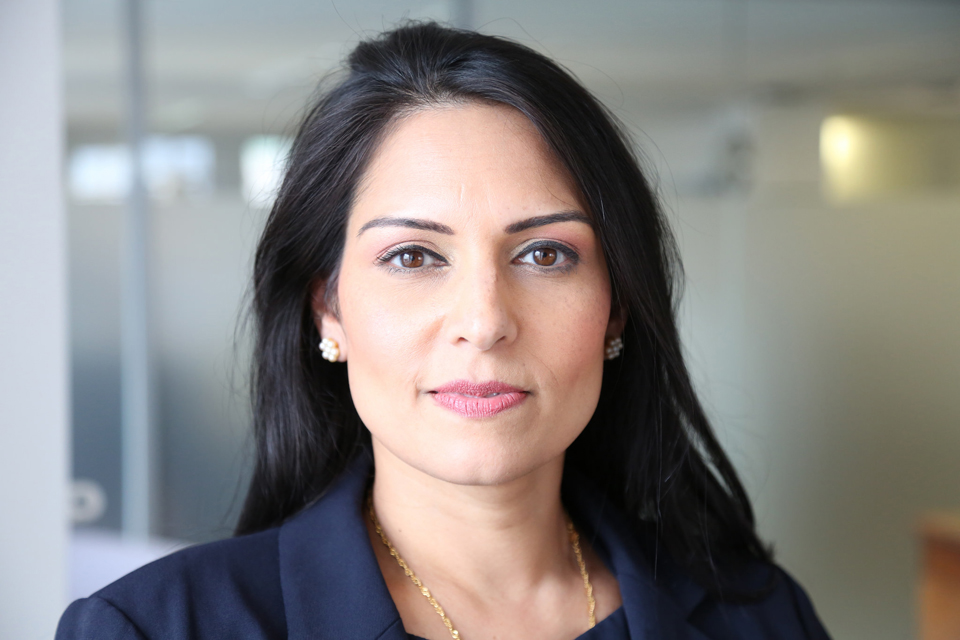Priti Patel: Modern Slavery
UK will double its development funding for tackling modern slavery.

I’m delighted to be speaking here and grateful to our hosts, Alliance 8.7, for bringing together such a diverse and impressive group of people from civil society, multilaterals, governments and the private sector.
We’re here today on behalf of some of the most victimised, brutalised, exploited people in the world.
The new global estimates being launched today provide a wake-up call to anyone who thought slavery had been consigned to the history books.
If all enslaved people were brought together in a single country, it would be the 34th most populous country in the world, ahead of Poland and Canada
And I want to thank the ILO, Walk Free Foundation and IOM for their work on this – these numbers are the most authoritative to date and show the full extent of modern slavery in the world today.
There’s no question that we need to collaborate and work together, across all sectors, if we’re going to change this picture.
The challenge
These estimates reveal the enormity of the challenge.
Today, in some countries it can be less difficult to move people across borders than drugs and guns. Forced labour is a $150billion dollar industry – in comparison the global response is not sufficient.
In fact the criminal networks that drive slavery sometimes seem a lot more organised than those who want to counter it.
And that has to change.
One of the defining features of modern slavery, in whatever country it occurs, is that it targets the most vulnerable.
I recently visited a safe house in Lagos where they are supporting girls and women who have been trafficked. Many of the victims are in their teens, one girl there is just seven years old.
The horrors they have endured are unthinkable. And speaking to some of the survivors – you realise how completely the victims are deceived…lured in by promises of waitressing jobs and then trapped and exploited in the most brutal, dehumanising ways. These girls are abused, raped; their organs are taken and sold.
Call to action
This is surely something we can all agree on here at the United Nations – to stand together against this horrific exploitation of human beings and say enough is enough.
Many of you have been working for years to tackle modern slavery, forced labour and human trafficking.
But I think we can all agree that the political will; the urgency, and the focus of the response – including from governments - has been lacking.
That is why the UK’s Prime Minister, Theresa May, just now brought together a group of world leaders who want to stand up in the fight against slavery - and who want to challenge themselves and the international community to step up and take action to end forced labour, modern slavery and human trafficking – for everyone, everywhere.
And I’m delighted to announce here that 37 countries from all regions across the globe have signed up to a powerful Call to Action - which is a clear statement of intent, with a simple message: we will not tolerate this exploitation in our societies.
It not only makes that political commitment clear, but also sets out the practical actions that we will take to end slavery in our societies…
…From creating and publishing national strategies for tackling modern slavery, to strengthening law enforcement, to giving the victims justice, care and support.
And it also provides direction for the rest of the international community; calling for better evidence, more resourcing, and a more joined up response.
So I’m very pleased to be presenting the Call to Action to this group now, on behalf of all those who have endorsed it.
This has the potential to be a turning point in the fight against modern slavery…the moment the world stood up and said enough is enough.
I hope that more countries will sign up to this document in the coming months, and that those who have endorsed it will make further commitments to turn promises into action.
UK action
The UK, for our part, wants to do more. We are a longstanding pioneer and advocate on the need to tackle the scourge of modern slavery.
Today our Prime Minister announced new domestic measures, and an investment £20million in the new Global Fund to End Modern Slavery; partnering with the United States to provide seed funding for this new initiative - which seeks to leverage $1.5 billion to address the resourcing gap for modern slavery. We hope other donors will join us in this endeavour.
In total this means the UK will double its development spending on modern slavery to £150million, enabling more work in collaboration with source and transit countries.
Of course we need to work together, with collaboration across sectors, if we are to make real progress here.
And the UK will work closely with governments to help them translate political will to action on the ground.
Last year, the Prime Minister announced we would help to strengthen Nigerian law enforcement to investigate and prosecute slavery and to support victims.
Conclusion
Because as the Call to Action makes clear, modern slavery is a global phenomenon…it lurks in every corner of the globe and the world must come together to tackle it.
This is about our shared humanity - we cannot accept a world where human beings are sold on the market.
We all have a role to play, we all need to rise to the challenge.
Thank you.